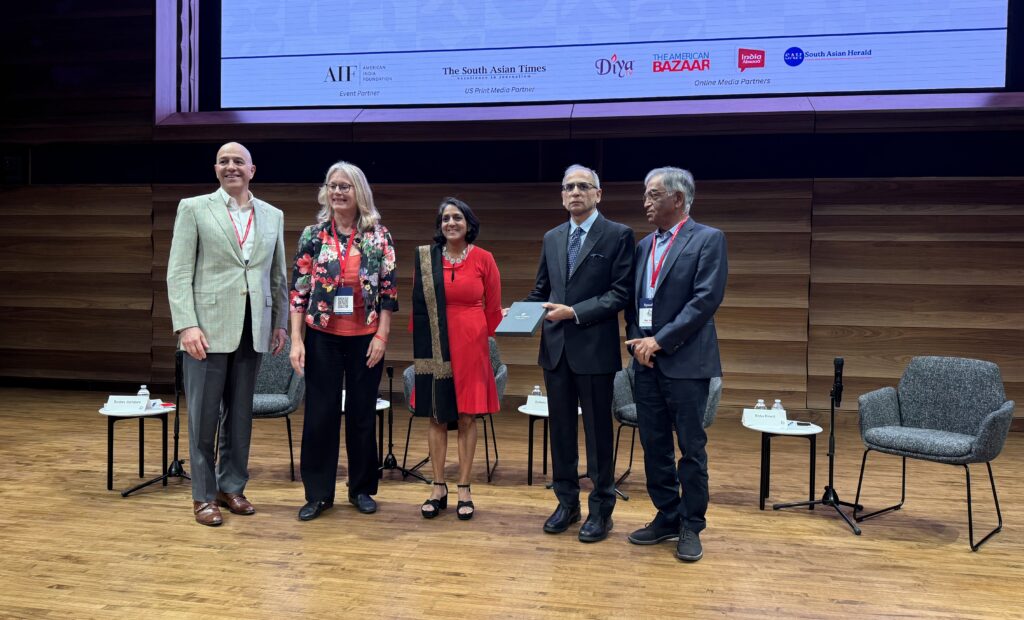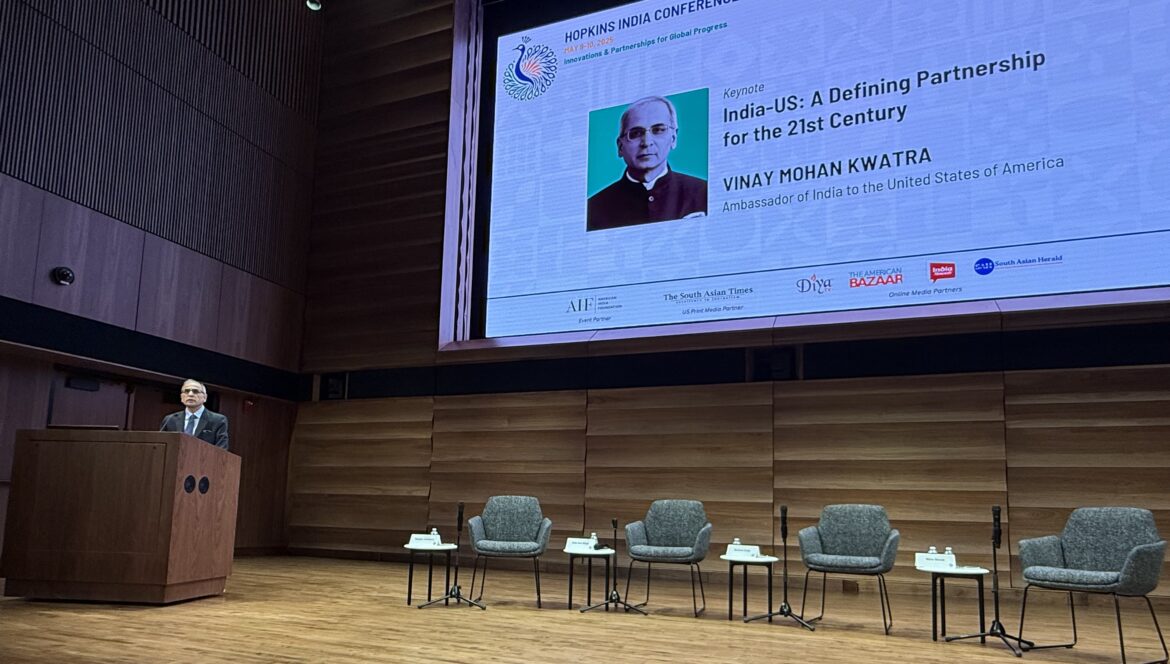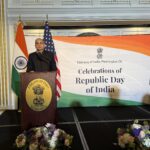India’s Ambassador to the United States, Vinay Kwatra, emphasized the robust bilateral framework that India and the United States have built to combat “terrorism, extremism, radicalization, drug trafficking, illegal migration, and cybercrime.”
Ambassador Kwatra delivered the keynote address on “India-US: A Defining Partnership for the 21st Century,” at the inaugural Hopkins India Conference on May 9, 2025, at the Johns Hopkins University Bloomberg Center in Washington, D.C.
The two-day conference featured over 80 thought leaders, policymakers, academicians, and corporate leaders from both India and the United States to “design actionable solutions for a better world.”
Ambassador Kwatra noted, “We truly value the cross-border terrorism cooperation,” highlighting that in the wake of the April 22 Pahalgam terror attack, India received overwhelming support from the United States.
“President Trump was in fact the first leader to speak to my Prime Minister after the Pahalgam attack,” he said, adding that incidents like these “clearly point to the need for India-US partnership to stand up to the terrorism and clearly convey to the world that there would be zero tolerance for such terrorist attack and their backers and their supporters who kill innocent civilians, innocent tourists, in this case, in Pahalgam.”
Ambassador Kwatra underscored the strong bipartisan support from members of the U.S. Congress, who condemned the attack and expressed solidarity with India. Prior to his remarks, he invited attendees to observe a moment of silence in honor of the 26 civilians killed in the Pahalgam attack.

Turning to areas of strategic cooperation, Kwatra highlighted the expanding energy partnership between the two nations, noting a trade volume of approximately $15 billion. “We are expecting this to increase by at least another five to ten billion in coming years,” he said.
He also discussed the recently launched Transforming the Relationship Utilizing Strategic Technology (TRUST) initiative, aimed at strengthening cooperation in critical emerging technologies, including defense and artificial intelligence. He described TRUST as a “fitting indicator” of the future direction of bilateral collaboration.
Kwatra also introduced the Indus Innovation Bridge, which seeks to foster partnerships between academic institutions and industries, linking these collaborations to public and private sector investments in sectors like space and energy. He emphasized the importance of institutions such as Johns Hopkins in contributing to these emerging areas of cooperation through their advanced research capabilities.
“The India-US defining partnership for the 21st century is indeed a shared priority,” he said, noting that it is one of the few policy areas enjoying bipartisan consensus in Washington.

Reflecting on the evolution of the bilateral relationship, the Ambassador observed, “I will only say that our relationship what it is today. It was not always like this, the habits of cooperation that we have cultivated, particularly in the last decade or so, were not always so enduring. And the last decade in this context has truly been transformative for our ties.”
He cited Prime Minister Narendra Modi’s 2014 address to the U.S. Congress, where the Prime Minister said both countries had overcome “the hesitations of history.”
“Over the last 10 years, the more time we have spent with each other, the more we have understood each other, the more we understood each other, the more we did together, and the more we did, the more our partnership grew,” Kwatra said. In a rapidly shifting global landscape, he added, India and the U.S. have formed “a truly genuine, comprehensive strategic partnership.”
He also outlined four key drivers behind this relationship. The first is the “great friendship” between Prime Minister Modi and President Trump, which has helped shape a confident and forward-looking bilateral agenda. Kwatra said the February 13 visit to the White House was pivotal in launching a “very ambitious agenda of partnership,” covering defense, economic cooperation, counterterrorism, energy, and advanced technologies.
The second driver is India’s economic trajectory. Currently at roughly $4 trillion, India aims to double its GDP to $8 trillion by the end of the decade – growth that Kwatra said will run parallel to a deepening of India-U.S. ties.
The third driver is the convergence of strategic, economic, and geopolitical priorities. The fourth is the people-to-people connection, especially the Indian American diaspora of approximately five million, which he described as “a very strong, growing, vibrant and a contributory bridge to the relationship.”
Kwatra also highlighted the transformation in defense cooperation. From negligible trade in 2000, the bilateral defense trade has grown to $25 billion, driven by procurement and strategic alignment.
He noted India’s longstanding collaboration with Johns Hopkins University across fields including medicine, public health, engineering, and data science. He said this partnership reflects India’s commitment to addressing global challenges through knowledge exchange.
In her opening remarks, Founder and faculty Co-chair of the Gupta-Klinsky India Institute at Johns Hopkins University, Amita Gupta acknowledged there is “a lot of uncertainty,” across the globe, especially in parts of South Asia.
“I am really happy to have a platform such as the India Institute, to be a place where we can come together and play a small role in crossing ideas, having dialogue, and having meaningful stakeholders to come together and advance cooperation and partnerships,” Gupta said.
She praised the faculty steering committee for its guidance and affirmed the Institute’s mission to create a “superhighway for communication and collaboration.”
She expressed her gratitude to the Johns Hopkins Gupta-Klinsky India Institute and Indiaspora for co-organizing the event, and thanked the American India Foundation for its role as an event partner. She also acknowledged South Asian Herald for serving as an official digital media partner for the event.






